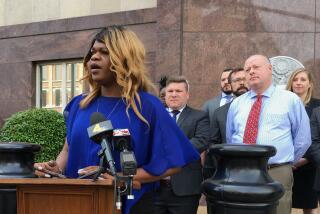From traffic ticket to Supreme Court: a gay couple’s legal odyssey
At first, they were just joking.
Thom Kostura had gotten a traffic ticket, and he and his partner Ijpe DeKoe had swung by a New York courthouse to pay it off. The county clerk’s office was right there.
New York had legalized same-sex marriage about a week earlier in July 2011. DeKoe was going to deploy to Afghanistan in a week. Kostura brought the subject up first.
“It was one of those games of who was going to crack a smile first,” DeKoe, now 35, said. “And neither of us backed down.”
It was a 23-hour engagement. They notified family, filled out the paperwork and had a $71 wedding, which included the cost of the marriage license, a pizza and a bottle of prosecco.
Little did they know that the modest ceremony would one day be considered by the Supreme Court.
DeKoe served in Afghanistan for nine months and came back safe, and in June 2012, the couple moved to Tennessee, where DeKoe was stationed.
“We realized it would come with some challenges,” DeKoe said.
In Tennessee, like 13 other states, same-sex marriage isn’t allowed, and the state does not recognize out-of-state gay marriages. But DeKoe and Kostura said they quickly integrated into their Memphis neighborhood, made good friends and lived as a married couple, no matter what the state said.
They were eventually approached by a friend who asked them if they would be willing to join a case that aimed to legalize same-sex marriage in Tennessee. They met with the lawyers by phone. Were they willing to be plaintiffs?
The couple hesitated.
“We’re both pretty private people when it comes to talking about our personal lives,” DeKoe said.
But then they thought about stories of transgender teens killing themselves, and thought about their own adolescence in the 1990s, when they met as counselors at a summer camp.
“It’s always important to know that there are couples out there fighting the same fight,” DeKoe said. “As we’ve gotten more involved in the case, we’ve realized the importance.”
DeKoe, a Sgt. 1st Class in the Army and Kostura, 32, an artist and graduate student at the Memphis College of Art, are now among more than a dozen plaintiffs from four different states in an appeals case that will go before the Supreme Court in April.
On Friday the justices agreed to hear cases from Michigan, Kentucky, Ohio and Tennessee, where state officials are defending laws that limit marriage to a man and a woman. One question before the court: Do gays and lesbians have a right to marry nationwide under the Constitution’s guarantees of equal treatment? Another: Must states recognize same-sex marriages, like Kostura and DeKoe’s, that took place in other states?
“This is a fundamental question of equality and justice for LGBT people in this country, and to be on the brink of a final, and we hope, fair resolution grounded in these cherished principles of our Constitution seems almost unbelievable,” said Kate Kendell, executive director of the National Center for Lesbian Rights, a legal organization that is which is a co-counsel in the Tennessee case.
The court will hear arguments in April, and DeKoe and Kostura plan to be there. The court will likely rule in June. If they win the case, they plan to celebrate much as they did their wedding, with friends and some of what they called “adult beverages.”
“We’ll really just be excited for couples in Tennessee,” DeKoe said.
Kostura chimed in, “And hopefully couples in all 50 states.”
For more news, follow @smasunaga.
More to Read
Sign up for Essential California
The most important California stories and recommendations in your inbox every morning.
You may occasionally receive promotional content from the Los Angeles Times.











